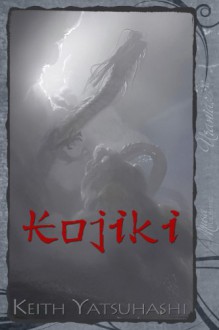 (Book provided by the author through ARR #1181 in the Making Connections group, in exchange for an honest review.)
(Book provided by the author through ARR #1181 in the Making Connections group, in exchange for an honest review.)"Kojiki" is, in my opinion, quite a visual story, and would be just as suited if turned into a movie. The author wrote vidi descriptions that allowed me to picture whatever was going on clearly enough—and there was a lot going on. You may not like the story as much as I did if you're not into action-packed plots; if you are, though, then go ahead.
The story may be more geared toward a younger audience, or at least one who is familiar with anime and some of their most popular themes, such as battles between spirits to save the world. However, there's no dumbing-down here, as it also deals with deeper themes (treason, lost love, trust issues, being torn between saving or killing a friend...). I appreciate when books go that road, and don't remain stuck to surface feelings and plots, the way things too often are in such works.
There are a couple of things here I'm not too sure about. For instance, Keiko is quickly thrown into the action—she doesn't spend a third of the book looking for the gate, or getting into the swing of things; part of me was glad about that, while another part thought it may have been a little too abrupt. There are also several characters and points of view to follow; this isn't a problem for me, but, again, I found those just a tad bit heavy to get into at first (which means that readers who are less familiar than I am with POV switches might have a harder time here). Another thing that may detract readers is the use of Japanese language. Someone like me, who speaks just enough of it to understand the (quite basic) vocabulary and sentence structures used here, won't feel lost; on the other hand, I can imagine that someone who doesn't speak the language may not always guess what those words are about (sometimes the context or dialogue provides an explanation... and sometimes not).
On the other hand, I think the whole mythology unfolding in the book should be easy to understand: spirits linked to elements (water, air, nature, earth...), fighting with their guardians (lesser spirits tied to the same elements) to prevent the world from being destroyed. Pretty basic at first sight, except that what could have been your good old black and white morality undergoes a few twists here. While the battle is fought above Japan, the spirits involved aren't only Japanese, and hint at different cultures—in other words, they're not anchored in one time and one place, and truly represent something bigger and older than that. At the same time, much like in legends, those spirits have to contend with their personalities and feelings, and aren't mere concepts: in that regard, they feel like real people, and have depths as characters (which isn't so easy to achieve when you're dealing with what are basically Gods). Perhaps the only character I didn't really get was Lon-Shan; maybe he would have deserved more screen time?
My conclusion: get this book if you're at ease with 3rd person narration with several points of view, enjoy vivid descriptions of scenes and battles, want to get a clear visual of what's happpening, and enjoy diving into plots that involve powerful beings who nevertheless have to deal with human-like problems. If you're into anime on top of it, you'll likely enjoy it even more.


 Log in with Facebook
Log in with Facebook 







